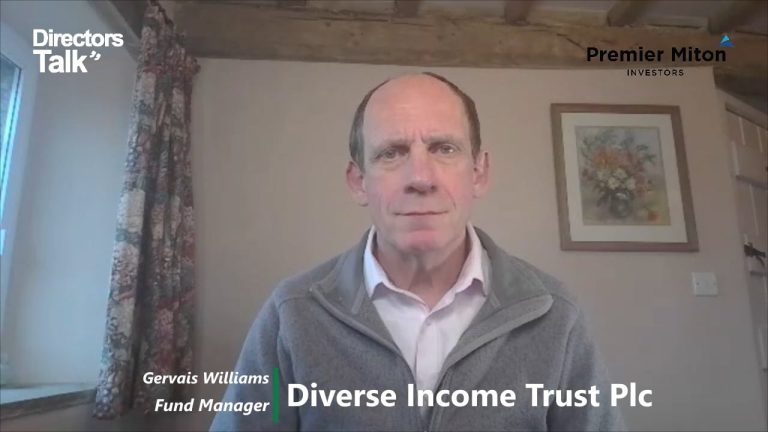Diverse Income Trust plc (LON:DIVI) Fund Manager Gervais Williams caught up with DirectorsTalk for an exclusive interview to discuss how the markets have reacted to the Ukraine conflict, the practical implications for companies in a declining market, why investors should give serious consideration to equity funds such as DIVI and provides examples of companies weathering the storm.
Q1: There’s an awful lot going in in the world at the moment. Obviously, the headline news is the Ukraine conflict, what’s your take on how the markets have reacted to the conflict?
A1: It’s kind of interesting. When you look at the Russian stock market, for example, that was down40% yesterday which was the third worse decline of any national stock market since Bloomberg have been measuring that so obviously that was extremely adverse.
What was interesting is we’re looking at over the background which was related in part to the margin pressure we’re seeing, weight increases, interest rate rises, inflation and so actually going into the downturn yesterday, a lot of hedge funds were near record shorts. So, as the markets’ prices were marked down, they went in and stepped in to buy some more shares and we saw quite a big recovery of markets in the first instance. That’s not because things are better going forward, it’s just that markets were well positioned for this setback and that’s led to people closing some of those shorts.
Q2: What are some of the practical implications for companies in a declining market?
A2: I think going forward, we’re going to see the problems with inflation probably get worse as a result of the Ukrainian conflict, I think we’re going to see ongoing wage inflation because there’s a shortage of staff, I think we’re going to see tax rises, bottlenecks of course, leading to companies coming under continued pressure.
Unfortunately, that will lead to certain companies going bust, those companies that can’t afford to pay the extra interest rates or the extra costs in terms of tax will go bust. There will be an increasing number of private businesses and zombie companies which go into receivership.
So, I think it’s going to be a pretty uncomfortable period coming up.
Q3: Given the current market situation, why should investors give serious consideration to an equity income fund such as Diverse Income Trust and their portfolio?
A3: The nature of it is that up to now, markets have gone up and you’ve been able to make very good money from making capital gains on share prices but if we think of going forward, the world’s going to be more unsettled, we’re going to get margin pressure, perhaps less growth as the Chinese economy is stagnant at the moment then perhaps stock markets just go sideways or even a little bit lower.
At those kind of times, it’s much better to invest in companies which generate cash, surplus cash, but more importantly pay out dividends and pay out growing dividends. If you can buy a companies which produces income and grows that income over time, providing you can reinvest the cash as you receive it, you get this compounding income which ultimately drives very attractive returns, even when stock markets aren’t going up.
That’s really why equity income strategies are very attractive in the long term.
Q4: Could you give us some examples of stocks in your funds that are in a good or best position to weather the storm and why they would do that?
A4: If you look at the portfolio, the kind of companies we select are those which have strong balance sheets.
A good example might be Galliford Try construction business, it’s capitalised around £200 million and it’s got almost the same amount of cash already in its balance sheet so a very safe company. A company that is trading well most particularly it pays a good and growing income, income is about 3.5% at the moment and growing nicely and so, absolutely, with the long term contracts it gets from governments, really good news.
Perhaps another example might be the energy sector. You can’t just turn all our filling stations off so a company like i3 Energy which is a company involved in onshore mainly in Canada and the UK and is involved in generating cash from income, from selling its oil and gas, it’s doing about 19 hundred thousand oil and gas equivalent a day, it’s probably going to increase its production in the next 3-5 years, it’s already yielding 5.5%, again a very attractive valuation with the ability for that to grow.
Perhaps a third example iEnergizer, not a company involved in the energy sector, despite its name. This is a company involved in helping companies engage with their customers so when you go on a site you see that little chat bots, they’re often behind some of those, they’re involved in answering questions and dealing with guarantees and all that kind of thing. They have a low cost base, they operate principally out of India and Mexico but again, they’ve just talked about how their very high levels of service are leading to more and more customer coming their way. There again, a very strong balance sheet, paying a decent yield, it’s just under 5%, but growing very nicely.
Good and growing income, we believe, is a really nice way of generating attractive return in an unsettled world.
The Diverse Income Trust invests primarily in quoted or traded UK companies with a wide range of market capitalisations, but a long-term bias toward small and mid-cap equities. The trust may also invest in large cap companies, including FTSE 100 Index constituents, where it is believed that this may increase shareholder value.











































